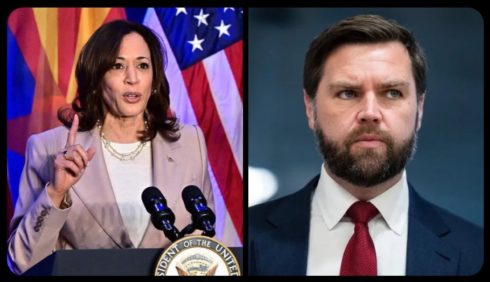The Biden campaign has launched an accusation against J.D. Vance, alleging that he is refusing to engage in a debate with Vice President Kamala Harris. This accusation was brought forward by Brian Fallon, the Biden-Harris 2024 Communications Director for Vice President Harris. Fallon highlighted that former President Donald Trump had selected Vance specifically for his debating prowess. However, according to Fallon, Vance is now retreating from the challenge following the leak of his support for a nationwide abortion ban.
In his statement, Fallon emphasized the inconsistency in J.D. Vance’s stance. “Donald Trump is the one whose campaign said he would debate ‘anytime, anyplace’ and who picked JD Vance specifically for his debating skills,” said Fallon. He continued, pointing out that Vance is “backing off” from the debate after the abortion ban leak. Fallon stressed that Vice President Harris has been a staunch advocate for reproductive freedom over the past two years, which may have contributed to Vance’s reluctance to face her in a debate.
Prolonged Discussions Over Debate Participation
According to Fallon, the debate between Vice President Harris and J.D. Vance has been a topic of discussion for several months. He noted that Vance’s reluctance to participate in the debate suggests an unwillingness to defend the Trump-Vance record on a public stage. “This debate has been discussed for two months now. If JD Vance is unwilling to defend the Trump-Vance record on the debate stage, he should just say so,” stated Fallon.
This ongoing debate over J.D. Vance’s participation highlights the significance of the upcoming 2024 presidential election and the contrasting positions of the candidates on key issues such as reproductive rights. The Biden campaign’s strategy appears to be focused on holding their opponents accountable for their positions and ensuring that voters are informed about where each candidate stands.
Harris Criticizes Vance’s Allegiance to Trump
In a video released by ABC News, Vice President Harris criticized J.D. Vance, asserting that his loyalty lies solely with Donald Trump and not with the American people. “Make no mistake: J.D. Vance will be loyal only to Trump, not to our country,” stated Harris in the video. This statement underscores the Biden-Harris campaign’s narrative that Vance prioritizes his allegiance to Trump over his responsibilities to the nation.
On Wednesday night, J.D. Vance made his first public appearance since accepting the nomination for vice president alongside Donald Trump in the 2024 presidential election. As the campaign heats up, the Biden-Harris team continues to press Vance to defend his positions and engage in a direct debate with Vice President Harris, emphasizing the importance of transparency and accountability in the electoral process.
JD Vance Declines Debate with Kamala Harris
Senator JD Vance, the former running mate of President Donald Trump, has opted not to participate in a debate with Vice President Kamala Harris ahead of the upcoming Democratic National Convention (DNC). The decision, announced by Vance’s campaign team on Wednesday, has stirred controversy and speculation within political circles.
Vance’s team cited concerns over the uncertainty surrounding Harris’s role as the Democratic candidate, highlighting a lack of clarity that they believe undermines the purpose and fairness of such a debate. This move comes amid a backdrop of heightened political tensions and strategic maneuvering leading up to the convention, where the Democratic Party is expected to solidify its stance and leadership for the upcoming election season.
Political Strategy and Public Perception
Kamala Harris underscores the strategic considerations and calculations prevalent in contemporary political campaigns. While campaigns often seek to control narratives and mitigate risks, opting out of debates can also invite scrutiny and accusations of avoidance.
Public perception of Vance’s stance may vary, with supporters potentially viewing it as a prudent move to avoid potential pitfalls or as a missed opportunity to demonstrate readiness and leadership. Conversely, critics could interpret it as a lack of confidence or a refusal to engage in direct confrontations on policy and ideological differences.
As the election season progresses, the repercussions of Vance’s decision and the ensuing discourse are likely to shape voter perceptions and influence strategic decisions within both political camps














